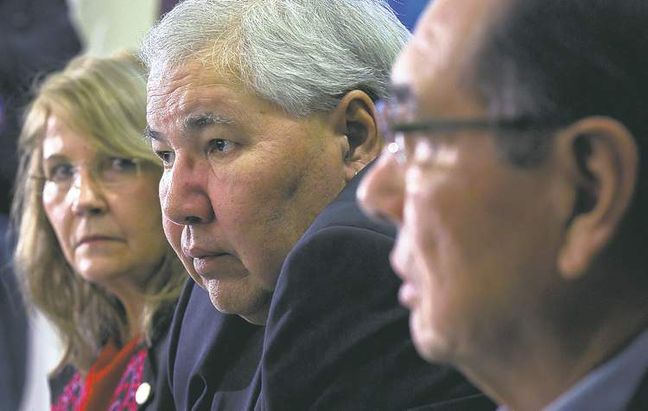"Many Survivors Are in Terrible Pain"
By Terri Theodore
Tears form in Barney Williams' eyes and his hand rests over his heart when he speaks about how important a report on residential schools is for First Nations who grew up in the church-run schools. "Many survivors are in terrible pain," said Williams, himself a residential school survivor and an elder with the Truth and Reconciliation Commission, which released its interim report Friday. He said the report is proof many of the 150,000 aboriginal children who were put in the residential school system suffered horrible neglect or physical and sexual abuse. Williams, 73, went to a residential school on the west coast of Vancouver Island, not far from his Tla-o-qui-aht First Nation reserve, near Tofino, B.C. He was "not quite seven" when he was first sexually assaulted, he stated. "Pedophiles have their victims. They used you for a while until they found another victim." It's a story he's told all over Canada, but he said many still don't believe something so horrible could be part of Canada's history. "A lot of people I talked to would say, 'Well gee, you know priests and nuns would never do that.' That's the belief, right?" he said. "I'm saying, 'Well, you know what? They did that, because my abusers were both male and female."' That's why he feels the commission's recommendation to use the education system to tell students what happened is a key part of the report. "It's going to take a lot of work to convince the general public that this really happened. There is still doubt among the general population." Justice Murray Sinclair, the commission's chairman, said panel members were struck by the amount Canadians don't know about aboriginal people and the sorry legacy of residential schools. "It has been through the use of an education system by the Canadian government that we have established and created the situation that exists within aboriginal communities and within aboriginal families in this country," Sinclair said at a news conference. "Also, it is through the educational system that non-aboriginal Canadians have been taught what they've come to learn about aboriginal people or not learned about aboriginal people in this country. We believe it is through the educational system that that information can be corrected, that that lack of information can be filled." Sinclair also called on the government to mount a public information campaign to educate Canadians. It took 130 years to get to this point in the process, Sinclair said, and it may take that long again for First Nations to recover from the abuse. Commissioner Marie Wilson told reporters that because the residential school stain was never taught in Canadian schools, no one knew what happened to generations of aboriginals. "We have all been the losers for lack of that knowledge and understanding. It has led us to a place of stereotypes and judgment." The commission was set up to help First Nations heal from abuses in a system that was "an assault" on aboriginal children, their families and their culture, the interim report said. The report said the schools "often were sites of institutionalized child neglect, excessive physical punishment, and physical, sexual and emotional abuse." The commission found several generations of children were "traumatized" by being abused, witnessing abuse or being "coerced to participate in abuse." Aboriginal children were taken from their families and forced to attend the schools. The first opened in the 1870s and the last closed in 1996. The commission makes 20 recommendations in its interim report, including a call for the federal government to distribute a framed copy of Prime Minister Stephen Harper's historic formal apology to residential school survivors. It says the apology should be displayed prominently in every secondary school in the country and delivered to every known residential-school survivor. Another recommendation calls for health and wellness centres to offer trauma and grief counselling for residential-school survivors. Northwest Territories Education Minister Jackson Lafferty has committed to an education program about residential schools in his territory and attended the news conference. Lafferty, who addressed the crowd first in his Dene language, also went to a residential school, but has been able to retain his language. "We lost our childhood, we lost our families, the joy of our spirits and our innocence." He said the release of the interim report allows thousands of aboriginals across Canada to take another step in finding peace. The interim report comes as the commission reaches the halfway mark in its five-year mandate. The commissioners are set to deliver their full report when their mandate expires in 2014.
|
.
Any original material on these pages is copyright © BishopAccountability.org 2004. Reproduce freely with attribution.
